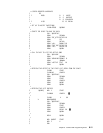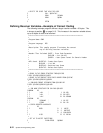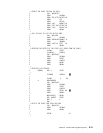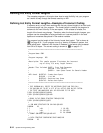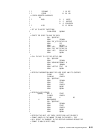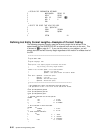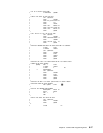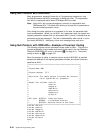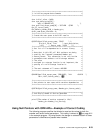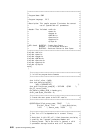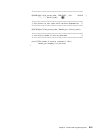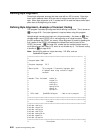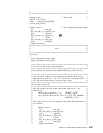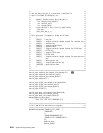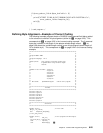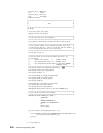/ᑍᑍᑍᑍᑍᑍᑍᑍᑍᑍᑍᑍᑍᑍᑍᑍᑍᑍᑍᑍᑍᑍᑍᑍᑍᑍᑍᑍᑍᑍᑍᑍᑍᑍᑍᑍᑍᑍᑍᑍᑍᑍᑍᑍᑍᑍᑍᑍᑍᑍᑍᑍᑍᑍᑍᑍᑍᑍᑍ/
/ᑍ initialize program data elements ᑍ/
/ᑍᑍᑍᑍᑍᑍᑍᑍᑍᑍᑍᑍᑍᑍᑍᑍᑍᑍᑍᑍᑍᑍᑍᑍᑍᑍᑍᑍᑍᑍᑍᑍᑍᑍᑍᑍᑍᑍᑍᑍᑍᑍᑍᑍᑍᑍᑍᑍᑍᑍᑍᑍᑍᑍᑍᑍᑍᑍᑍ/
char initial_value = x;
char text_description[5] =
"test of QDBLDBR API ";
char qualified_usrspc_name[2] = "GETLDBR QTEMP ";
Qus_EC_t error_code;
Qus_Generic_Header_1_t ᑍheader_ptr;
error_code.Bytes_Provided = ;
/ᑍᑍᑍᑍᑍᑍᑍᑍᑍᑍᑍᑍᑍᑍᑍᑍᑍᑍᑍᑍᑍᑍᑍᑍᑍᑍᑍᑍᑍᑍᑍᑍᑍᑍᑍᑍᑍᑍᑍᑍᑍᑍᑍᑍᑍᑍᑍᑍᑍᑍᑍᑍᑍᑍᑍᑍᑍᑍᑍ/
/ᑍ Create the user space to hold API results ᑍ/
/ᑍᑍᑍᑍᑍᑍᑍᑍᑍᑍᑍᑍᑍᑍᑍᑍᑍᑍᑍᑍᑍᑍᑍᑍᑍᑍᑍᑍᑍᑍᑍᑍᑍᑍᑍᑍᑍᑍᑍᑍᑍᑍᑍᑍᑍᑍᑍᑍᑍᑍᑍᑍᑍᑍᑍᑍᑍᑍᑍ/
QUSCRTUS(qualified_usrspc_name, "SPACE ", 1,
&initial_value, "ᑍALL ", text_description,
"ᑍYES ", &error_code, "ᑍUSER ");
/ᑍᑍᑍᑍᑍᑍᑍᑍᑍᑍᑍᑍᑍᑍᑍᑍᑍᑍᑍᑍᑍᑍᑍᑍᑍᑍᑍᑍᑍᑍᑍᑍᑍᑍᑍᑍᑍᑍᑍᑍᑍᑍᑍᑍᑍᑍᑍᑍᑍᑍᑍᑍᑍᑍᑍᑍᑍᑍᑍ/
/ᑍ Get list of file dependencies in current library ᑍ/
/ᑍ ᑍ/
/ᑍ Note that in this API call NULL pointers are being ᑍ/
/ᑍ used for the "ignored" parameters Member and ᑍ/
/ᑍ Record_Format. This convention is not valid as the ᑍ/
/ᑍ parameters must address a valid storage address. ᑍ/
/ᑍ The value ᑍ/
/ᑍ assigned to a storage location is not important, the ᑍ/
/ᑍ passing of a valid storage location is. ᑍ/
/ᑍ ᑍ/
/ᑍ The next statement will cause a MCH361 ᑍ/
/ᑍᑍᑍᑍᑍᑍᑍᑍᑍᑍᑍᑍᑍᑍᑍᑍᑍᑍᑍᑍᑍᑍᑍᑍᑍᑍᑍᑍᑍᑍᑍᑍᑍᑍᑍᑍᑍᑍᑍᑍᑍᑍᑍᑍᑍᑍᑍᑍᑍᑍᑍᑍᑍᑍᑍᑍᑍᑍᑍ/
QDBLDBR(qualified_usrspc_name, "DBRL1", "ᑍALL ᑍCURLIB ",
NULL, NULL, &error_code); 12
/ᑍᑍᑍᑍᑍᑍᑍᑍᑍᑍᑍᑍᑍᑍᑍᑍᑍᑍᑍᑍᑍᑍᑍᑍᑍᑍᑍᑍᑍᑍᑍᑍᑍᑍᑍᑍᑍᑍᑍᑍᑍᑍᑍᑍᑍᑍᑍᑍᑍᑍᑍᑍᑍᑍᑍᑍᑍᑍᑍ/
/ᑍ Get pointer to user space which contains dependencies ᑍ/
/ᑍᑍᑍᑍᑍᑍᑍᑍᑍᑍᑍᑍᑍᑍᑍᑍᑍᑍᑍᑍᑍᑍᑍᑍᑍᑍᑍᑍᑍᑍᑍᑍᑍᑍᑍᑍᑍᑍᑍᑍᑍᑍᑍᑍᑍᑍᑍᑍᑍᑍᑍᑍᑍᑍᑍᑍᑍᑍᑍ/
QUSPTRUS(qualified_usrspc_name, &header_ptr, &error_code);
/ᑍᑍᑍᑍᑍᑍᑍᑍᑍᑍᑍᑍᑍᑍᑍᑍᑍᑍᑍᑍᑍᑍᑍᑍᑍᑍᑍᑍᑍᑍᑍᑍᑍᑍᑍᑍᑍᑍᑍᑍᑍᑍᑍᑍᑍᑍᑍᑍᑍᑍᑍᑍᑍᑍᑍᑍᑍᑍᑍ/
/ᑍ and display number of entries generated ᑍ/
/ᑍᑍᑍᑍᑍᑍᑍᑍᑍᑍᑍᑍᑍᑍᑍᑍᑍᑍᑍᑍᑍᑍᑍᑍᑍᑍᑍᑍᑍᑍᑍᑍᑍᑍᑍᑍᑍᑍᑍᑍᑍᑍᑍᑍᑍᑍᑍᑍᑍᑍᑍᑍᑍᑍᑍᑍᑍᑍᑍ/
printf("The number of entries returned is %d\n",
header_ptr->Number_List_Entries);
}
Using Null Pointers with OPM APIs—Example of Correct Coding
The following program specifies that blanks be used as the values for both the
member and record format parameters. This coding is shown at 13 on page 9-21
in the example program. By using blanks, the storage or address location of those
parameters is identified and passed when needed.
Chapter 9. Common API Programming Errors 9-19



